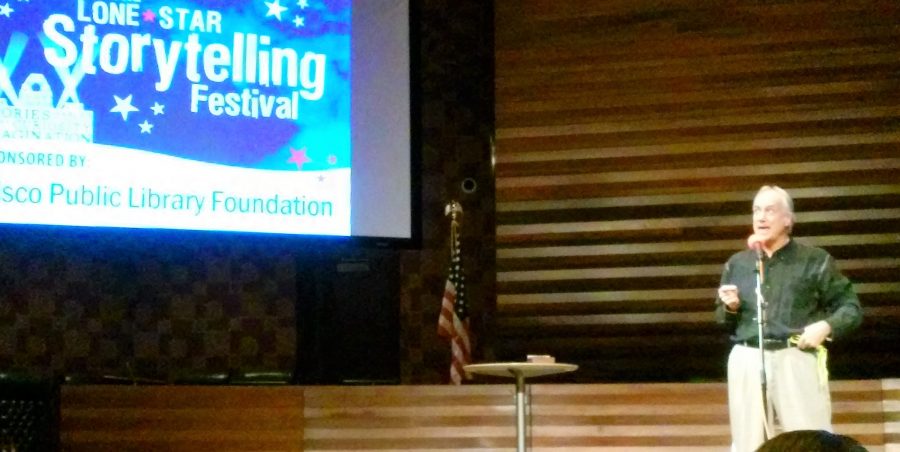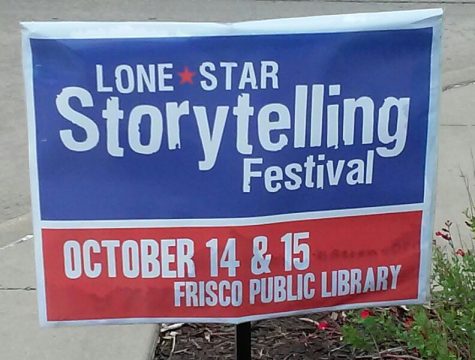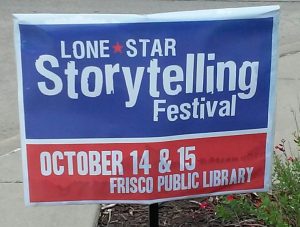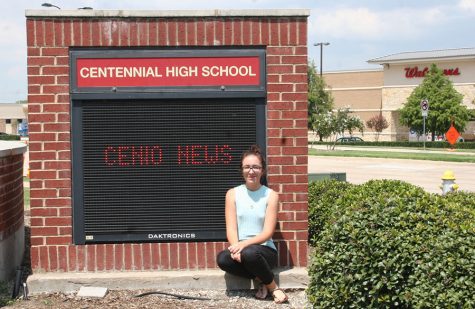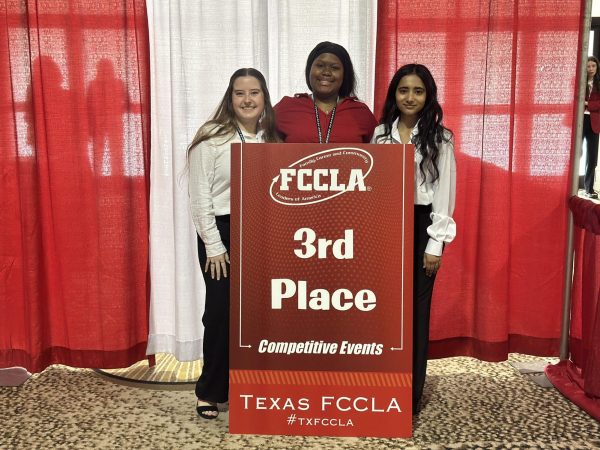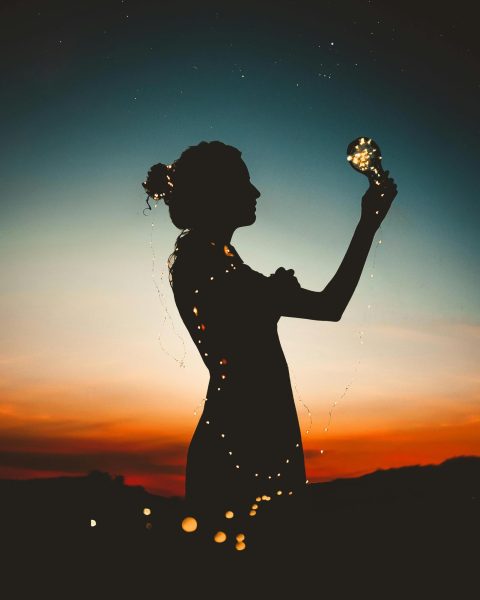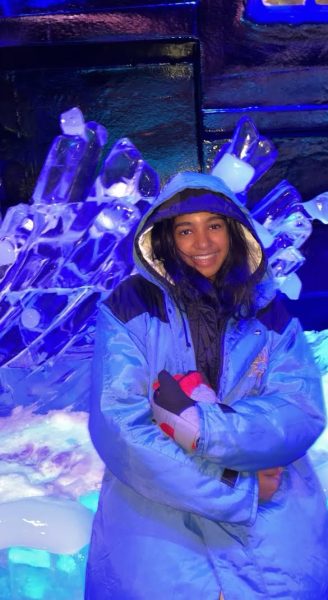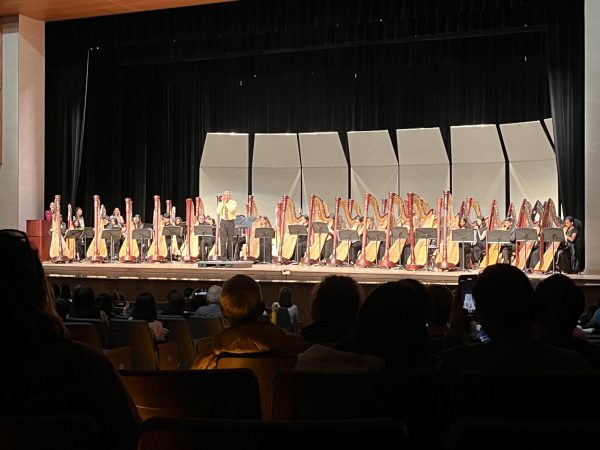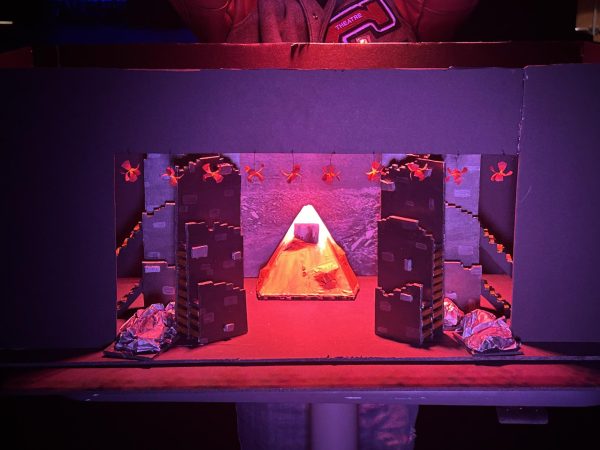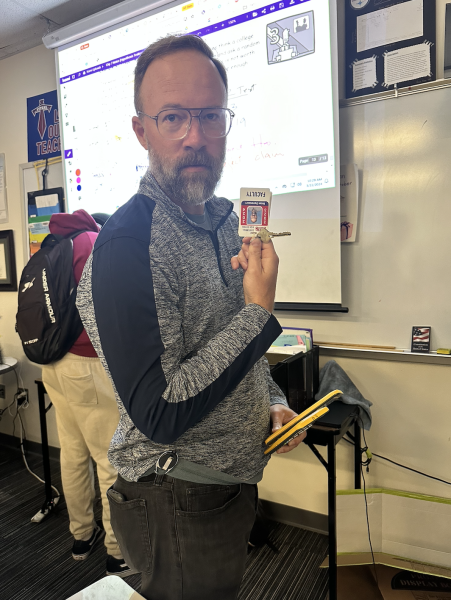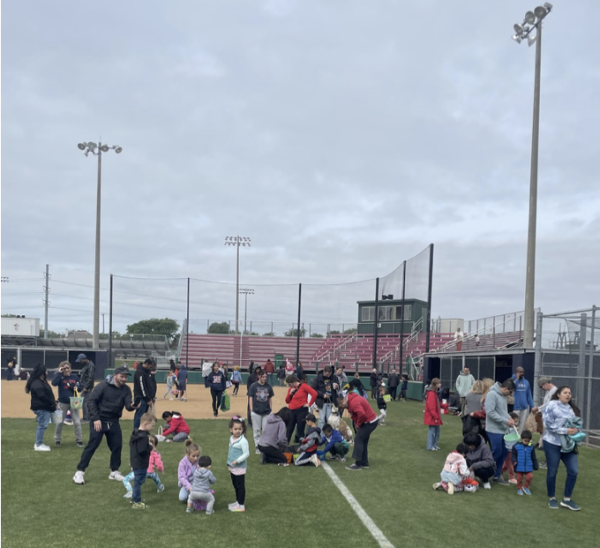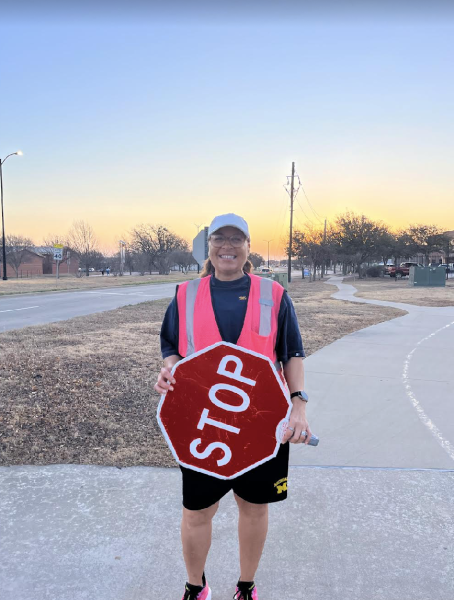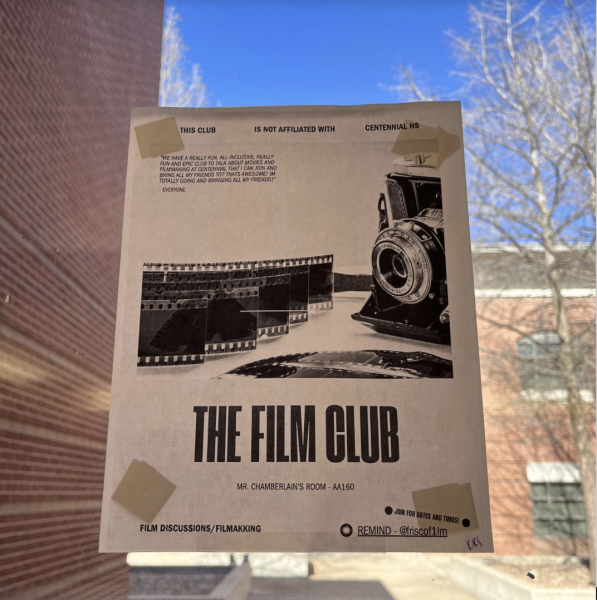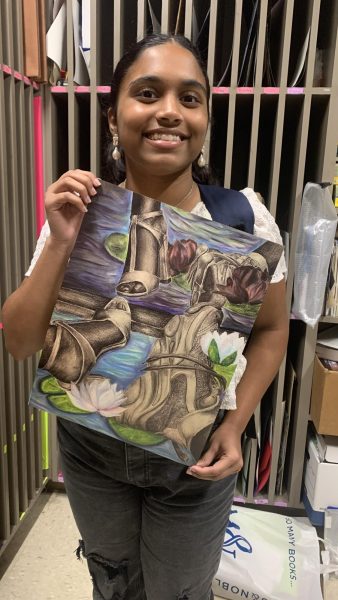The Art of Storytelling
David Novak performing at the Lone Star Storytelling Festival. Photo by Laura Nicolescu.
October 21, 2016
What started as a way to keep a culture’s memories alive turned into a contemporary art form millions of children and adults now enjoy as a way to forget the world around them, even if for only a few minutes. The Lone Star Storytelling Festival, held last Friday and Saturday at the Frisco Public Library, put on exhibit the oral art of storytelling, a lesser-known celebration of reading and writing that is struggling to gain popularity in the midst of a technologically-driven world.
The featured storytellers at the festival, David Novak and Barbara McBride-Smith, had a booked schedule of two days and nights of teaching the audience about the art, whether they were just being introduced to it or were experienced veterans. As a nationally acclaimed storyteller, a job he’s had for over 30 years, Novak says the art form is easy to explain to those unfamiliar to it.
“Just as the term storytelling implies, we tell stories,” Novak said. “But what that means is often interpreted differently by different people. Storytellers interpret traditional stories, folktales and mythology, and at the same time write their own stories.”
Novak says that becoming a storyteller was personally the perfect solution to a problem he never knew he had.
“My interest in storytelling really grew out of my involvement in theater arts,” Novak said. “Throughout my career I’ve been involved in different strands of theater arts as a director, an actor, a playwright, a designer, and when I got a chance in the late 1970s with a theater company in St. Louis to start telling stories as part of our work that we were doing in schools it really clicked for me that to be a storyteller was a chance to bring together all my interests.”
He says that while it was a surprise to him, it made sense for him to become a storyteller.
“As a storyteller I am simultaneously the writer, the director, the designer and the actor,” Novak said. “Throughout my studies and my career in theater I’ve also been interested in education, so that also makes sense in storytelling. When I was working in classrooms teaching students about storytelling I found myself in a very family friendly career. It was very gratifying to me.”
Novak says storytelling can even be tied back to the foundation of school.
“The traditional school calendar comes from an agrarian lifestyle, in which the storytelling season begins after the first frost until the first thaw,” Novak said. “That was the time that traditional cultures would gather together because of the seasonal change, keeping the memories and values alive.”
Storytelling originally grew out of such “tradition-bearers,” people who carry on customs that they’ve received from their cultural community, such as Native American traditions, African traditions and faith traditions.
“Certainly storytelling as a tradition has long been a part of how a culture maintains its memories, how a culture teaches its members of their values,” Novak said. “We think of these stories as whimsical, explanations for a world that we now have been able to explain with science, but in fact these traditions made the world into the first library.”
This library helps us see things in different ways.
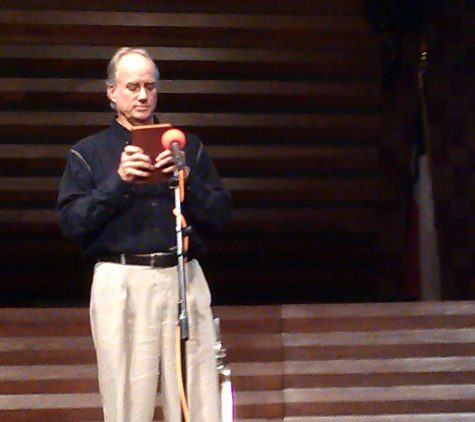
“These stories are not trying to explain actually how these things came to be, but they’re turning to used those things as markers as some kind of a story or fable that’s relevant to how we think we should be with each other,” Novak said. “You see these things that become endowed, such as trees, animals, or the environment, and you’re reminded of the story, and that keeps your own memory and your own sense of character. These traditions have a lot more depth, than from a modern perspective we sometimes give them.”
However, even though this still remains, storytelling has evolved into a modern American pastime little different from watching a movie or reading a book, thanks to the power of storytellers such as Novak who followed this trend.
“Over time I really developed a repertory of original and adaptive material as a creative storyteller,” Novak said. “I’m a modern American kind of guy who aims to ‘rediscover, recreate, and reanimate’ an art form that has a different relevance in the present day.”
No longer are stories just for maintaining traditions, but are for the pure enjoyment of all. Nonetheless, storytelling as an art form is gradually disappearing, Novak says, with technology acting as the median, making it increasingly easy to get isolated.
“As we are getting into a more technology driven world, into a culture that’s more media-driven, we’re losing touch with some of our ancestral traditions of people just talking to and listening to each other,” Novak said. “Ironically, the telephone, which was intended for us to talk to each other has become a device to help us avoid each other.”
He says the storytelling art form is not just a quaint, nostalgic pastime, but an opportunity to exercise gathering in a public space and hearing each other out. He adds that we are picking up habits that are eroding our ability to communicate clearly and coherently.
“If we don’t talk together, and don’t have a lot of conversations, we lose those skills, and I think that conversation as a skill is endangered at present in our modern society,” Novak said. “We all assume that we know how to do that, but there are certain skills we can learn.”
In response to this, over 40 years ago the National Storytelling Festival got started in Eastern Tenn. as an effort to renew an interest in the art form of people telling stories and listening and hearing stories out loud. It was this festival that lead to what Novak calls the “storytelling revival.”
“When the storytelling revival in America begins in the early 1970s, it’s largely folk traditions, but over the years more contemporary approaches have emerged and become very popular,” Novak said. “Recently there’s been a reappearance of storytelling as a spoken word art form in cafes and urban centers, where adults tell true stories about things that have happened to them, usually built around some sort of theme, kind of like karaoke only without the song. So I would call it an art form that reappears over and over and over again.”
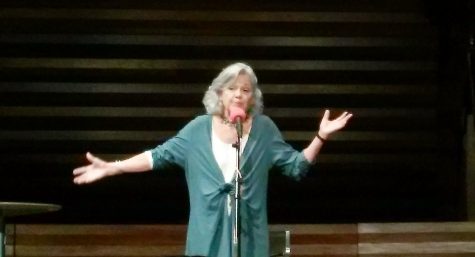
One of the things that makes not just storytelling, but conversation, special is the crossroads of cultures that occurs, as each storyteller is unique, making each story unique. These stories can range from the epics of history to what someone did this morning.
“I came out of theater and education—a lot of my colleagues come from different directions, like my colleague, Barbara McBride-Smith, whose background is in library science,” Novak said. “It’s very much an art form that’s about personal style, as there’s not any one way or right way to tell a story. It’s a little like being in a comedy show, but it’s not always funny, it doesn’t have to be.”
Novak says that the storytelling skill is available to everyone, but sometimes certain individuals emerge. At base, however, it’s a skill everyone has, regardless of if they’re professional at it or not.
“You can’t get your car fixed at the auto mechanic unless you can explain what’s going on, and that requires the ability to tell a story,” Novak said. “There are ways in which we have to tell stories all the time, and being able to tell a story is a very important ability for us just to get along with each other.”
For someone looking to become a storyteller, Novak says while there are certain abilities to learn, they can be traced to the simplest of things.
“When you’re studying acting all you’re learning is how to walk and talk—you’re just thinking about it in a way you’ve never thought about it before,” Novak said. “The more you learn that in acting the more you begin to tune into how that happens in real life and apply it to storytelling. There are certain things that make a story entertaining, and there are certain things that are important about how a story means something. There’s a number of levels of thought that go into the telling and crafting of a story that you can learn and improve at.”
The Lone Star Storytelling Festival has for 13 years involved such learned student storytellers that possess a skill above the rest, representing the future generation of the art form. Teaching such students about storytelling is one of the things that keeps Novak coming back to Frisco, along with Frisco’s charm that makes it the perfect community for storytelling.
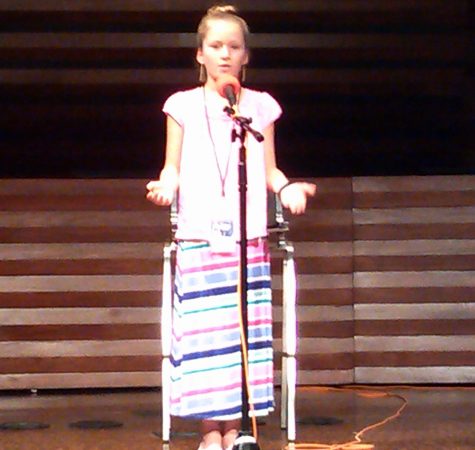
“There’s a special family culture here in Frisco, and I find that it makes sense that there would be a storytelling festival here,” Novak said. “This is my third time coming here, and I’m really impressed by Frisco’s willingness to create a platform for storytelling along with the response that people have to it.”
He praises Frisco for making itself available for something that may not have gained popularity in this community otherwise.
“The fact that the City Council is making its chambers available for this also speaks very highly of Frisco as a community.” Novak said. “It’s your leaders getting together with citizens talking out issues and working it out. This is just taking that daily practice and making a little bit more of an art form out of it so that we can enhance and enjoy that. This is a festival that I know I and my colleagues enjoy coming to for that reason. We don’t feel like we’re really trying to force anything down anybody’s throats.”
The Frisco Public Library also has a lot to do with the festival’s popularity.
“The library itself has a very rich culture and it’s the epicenter of making this possible and having it happen,” Novak said. “Libraries are being redefined in the present day with a more expansive idea of what their role is to serve the community. There’s an aspect of Frisco that is modernizing but still holding onto certain values that are intrinsic in a small town community.”
While it is thought to be outdated, storytelling is being kept alive with the storytelling revival along with the wisdoms of storytellers such as Novak, as a lot can be gained from it. It is a special kind of art form that has something for everyone, and its basis on active getting together and talking to people, whether in a small town or a big city, can even benefit the nation. Nowadays, this whole idea of “listening to each other” is exactly what America needs.
“The idea of our democracy is founded on discourse, on the ability of people to hear each other’s stories, to talk and to understand each other,” Novak said. “The storytelling revival that has come along all these years is in many ways an effort to address our needs to keep open the conversation, to be able to talk together and not shut each other out.”


